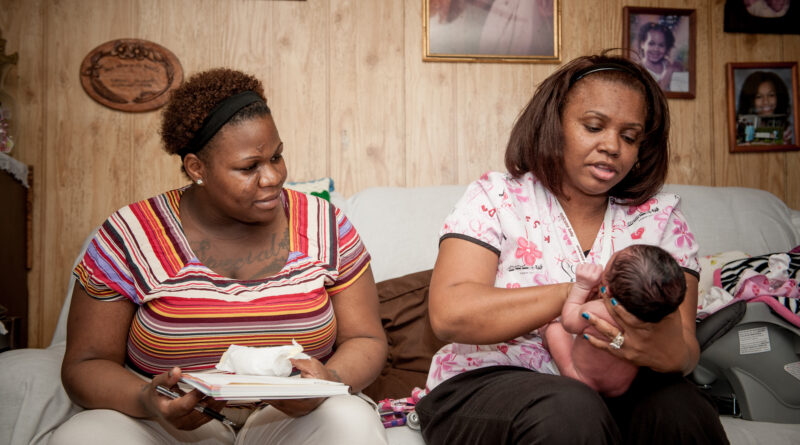Webinar: Maternal and Neonatal Health Assessments During RN Visits
The pandemic forced home visiting programs to go virtual, but in-person visits are now the norm again. This is especially helpful for conducting certain screenings and assessments, and for providing breastfeeding support. The Welcome Baby program‘s Registered Nurses provide all of this to families shortly after they return from the hospital with their newborn. The purpose of the RN visit is to check on the health and well-being of not only the baby, but the mother as well. Performing these assessments is essential because they can flag early signs of health problems in the baby and signs of postpartum depression or anxiety in the mother.
In the webinar below — hosted by LA Best Babies Network on May 10, 2023, for RN’s and other staff in our network of home visiting organizations and Welcome Baby hospitals — Licet Arroyo Zalma, a Lactation Consultant at Kaiser Permanente West Los Angeles Medical Center, discusses:
- Evaluating and managing common signs and symptoms of disease in newborns and in the postpartum patient
- Recognizing potential adverse outcomes in the postpartum mother and infant
- Performing a thorough assessment on the postpartum dyad
- Recognizing the abnormal physical findings seen in a mother or infant
- Understanding the role of health literacy and enhancing the understanding among patients with low health literacy
The physical maternal assessment includes:
- History (date of delivery, age, substance use, mental health issues)
- Checking to see if alert/oriented, experiencing headaches, walking or dizziness, swelling
- Checking vitals
- Looking for signs of postpartum preeclampsia
- Checking abdominal wound if had C-section, asking about pain management
How to check on the mother’s mental health after delivery:
- Look at the mother’s interaction with baby
- Was it an unwanted pregnancy or a teen pregnancy?
- Is mother crying? Sleeping all the time? Or not sleeping?
- Baby blues, postpartum depression/anxiety, postpartum psychosis
- 9% of women experience postpartum PTSD after childbirth
- Postpartum PTSD can be caused by real or perceived trauma during delivery
- Symptoms of postpartum PTSD: flashbacks, nightmares, irritability, difficulty sleeping, anxiety, panic attacks
- Postpartum PTSD is more prevalent in African American women
Breastfeeding assessment:
- Asses the breasts for symmetry, lumps, or changes in color
- Does baby have tongue tie?
- Does the mother have a pump? (it’s hard to increase breast milk supply with just pumping)
- Is mother cleaning the pump properly?
- There are many benefits to breastfeeding
Neonatal assessment:
- History (date of delivery, jaundice, weight)
- Vitals
- Broken blood vessels in eyes
- Eyes jaundiced
- Alert, sleepy, awake, fussy
- Color
- Feeding cues
- Skin: rash, scratches, spots
It’s also important to acknowledge that patients who do not speak English may have trouble understanding instructions from the hospital and navigating the healthcare system. They may need extra support and further explanation.
Telehealth is becoming more common, but it has its limitations. RN’s should know the pros and cons to telehealth visits.
About the presenter:
Licet Arroyo Zalma graduated from Santa Monica College in 1993 and obtained her BSN and MSN at the University of Phoenix. She has spent most of her nursing career working in labor and delivery but also has worked in pediatrics, NICU and postpartum care. She was an adjunct clinical professor at El Camino College and LA Valley College teaching the OB rotation. She has also been an NRP instructor and an AWHONN fetal heart monitoring instructor. Licet currently works at Kaiser West LA as a lactation consultant (IBCLC).
Watch the webinar recording here, and don’t miss the links to related resources below:
Related resources
- This webinar’s slides
- Postpartum Support International
- Postpartum Support International helpline: 1-800-944-4773 (#1 Español or #2 English)
- Kaiser West LA lactation clinic: 323-857-4121 / after-hours Kaiser Lactation Support line: 1-888-576-6225
- Melanin and Mental Health
- American Academy of Pediatrics – Breastfeeding Policy Statement
- Academy of Breastfeeding Medicine – Use of Galactogogues in Initiating or Augmenting Maternal Milk Production
- Tips on increasing milk supply
- American Academy of Pediatrics – Updated 2022 Recommendations for Reducing Infant Deaths in the Sleep Environment
- Institute of Medicine US Committee on Health Literacy – Health Literacy: A Prescription to End Confusion
- Office of Disease Prevention and Health Promotion – Healthy People 2023

